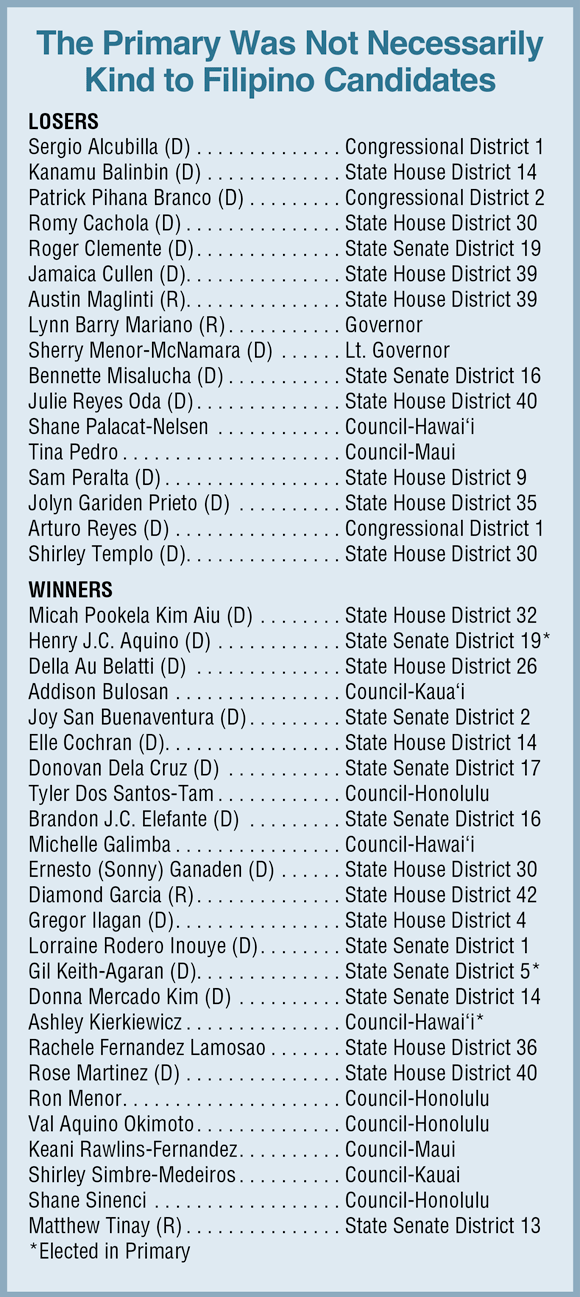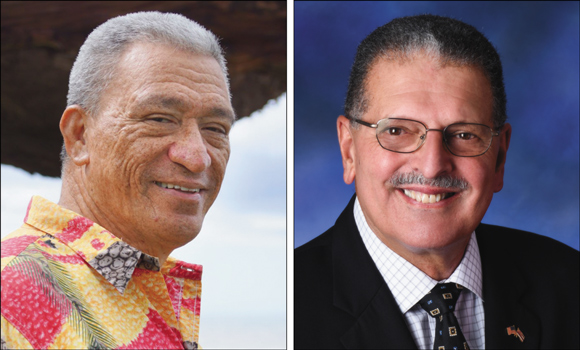
It’s Bissen vs Victorino
Maui has the lowest voter turnout in the State.
Alfredo G. Evangelista | Assistant Editor
The race for Maui Mayor between retired Judge Richard Bissen and incumbent Mayor Michael Victorino is now set for the November 8 General Election. With less than twelve weeks away, Victorino needs to make up a deficit after finishing second as Bissen garnered 13,407 votes (34.0 percent) to the Mayor’s 11,747 votes (29.8 percent). Whoever captures the supporters of also rans Kelly King (6,350 votes or 16.1 percent); Kim Brown (2,851 votes or 7.2 percent); Michael Molina (2,068 votes or 5.2 percent); Cullan Bell (1,769 votes or 4.5 percent); Alana Kay (244 votes or 0.6 percent); and Jonah Lion (96 votes or 0.2 percent) may settle the race before the General Election ballots arrive in the mails. There were 793 Blank Votes (2 percent) and 155 Over Votes (0.4 percent).
“From the bottom of my heart, Maraming Salamat po and Agyamanak unay kadakayo for your support and the trust you have placed in me with your valuable votes in the primary election,” said Bissen. “I humbly ask for your continued support in the general election on November 8.”
“Mabuhay and mahalo to Maui’s Filipino community for your vote of confidence in the Primary Election,” said Victorino. “I am honored to have earned your trust over the years. I know our home is special. I will always take care of our local people first—every day and always with no compromises. My decisions are rooted in what is best for Maui’s people because at the end of the day, we are all friends and neighbors. You can count on me to always put our community first and I humbly ask for your continued support and vote in the General Election.”
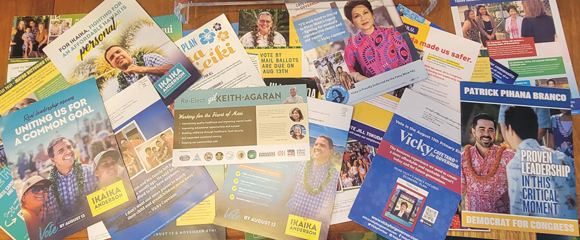
Photo: Alfredo Evangelista
The County Council
For County Council, every registered voter will be able to vote for the nine Councilmembers whether you live in the Council district or not.
Making it out of the primary for the Kahului residency seat were incumbent Tasha Kama (8,991 votes or 22.8 percent) and Buddy Nobriga (8,738 votes or 22.1 percent). There were 6,459 blank votes, 67 over votes, and 15,225 votes for the five other candidates (Carol Lee Kamekona, Cara Flores, Keoni Watanabe, Tina Pedro and Jack Schwartz). Nobriga is the nephew of Bissen and the scion of the Nobriga ranching and coca cola clan.
For the South Maui seat, Tom Cook (13,759 votes or 34.9 percent) and Robin Knox (12,242 votes or 31.0 percent) will face off in the General. Knox closed the gap in the final print out. There were 8,681 blank votes (22.0 percent), 30 over votes and 4,768 votes for Dennis Shea.
For the Makawao-Ha‘ikū-Pā‘ia seat, Nohe U‘u-Hodgins (11,922 votes or 30.2 percent) will face Nara Boone (7,608 votes or 19.3 percent). Dave Deleon came in a close third with 7,258 votes after leading Boone through the first two printouts. There were 7,850 blank votes, 52 over votes, and 4,790 who voted for Daniel Smith and Aram Armstrong.
Incumbent Yuki Lei Sugimura (20,360 votes or 51.6 percent) will face Jordan Hocker (7,517 votes or 19.0 percent) for the Upcountry seat. There were 6,230 blank votes, 41 votes and 5,332 votes for Renee Cruz. (Maui does not follow the 50 percent+1 rule where a majority in the Primary avoids a runoff.)
The races for the Lāna‘i seat (incumbent Gabe Johnson vs. former Councilmember Riki Hokama); the Molokai seat (incumbent Keani Rawlins-Fernandez vs. John Pele); East Maui seat (incumbent Shane Sinenci vs. Claire Kamalu Carroll); the West Maui seat (incumbent Tamara Paltin vs. Justin Herrmann); and the Wailuku-Waihe‘e-Waikapū seat (incumbent Alice Lee vs. Noelani Ahia) went directly to the General Election ballot as there were only two candidates in each district.
(There will also be several Charter amendments questions on the General Election ballot. Those questions will be the focus of a future article in The Fil-Am Voice.)
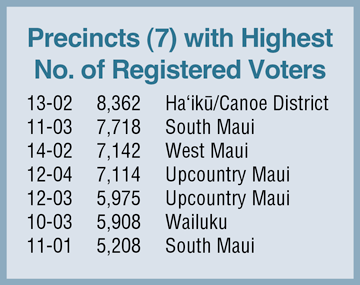
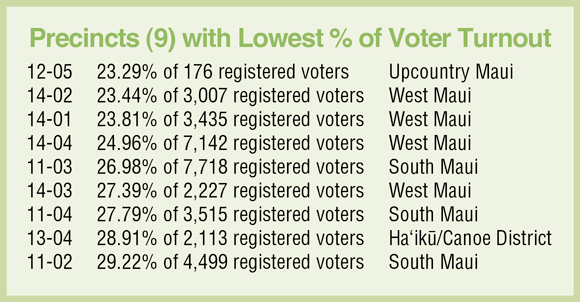
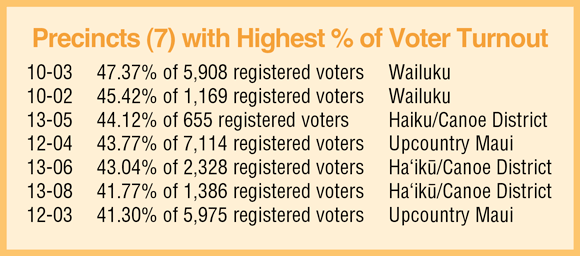
Who dat? And Do I Care?
With the number of blank votes and votes for other candidates, it is not a sure thing those who garnered the most for the various County seats will prevail. Additionally, the General Election usually draws more voters, even when there is no presidential election.
But quite a number of registered voters just didn’t return their ballots.
(Remember, if you don’t vote, don’t complain!) Voting is so much easier now with an all-mail-in balloting process and for those who are late, they can still vote (and even register to vote) on the day of the election.
The seven precincts with the highest number of registered voters are highlighted in the blue box.
Of the thirty-five precincts in Maui County, none of them surpassed a turnout rate of 50 percent or more. The nine precincts with the lowest percentage of turn-out (mail and in-person) are indicated in the green box.
By contrast, the seven precincts with the highest percentage of turn-out (mail and in person) are those listed in the orange box.
During the pandemic period, election strategy shifted from old fashioned door-to-door grassroots. Many candidates were wary of going house to house to encourage folks to vote. Likewise, many families did not welcome candidates coming to their homes to talk story.
For this Primary Election cycle, candidates relied more on radio, print, social media and mailers. (Our multi-generational household received thirty-one mailers and two “friend-to-friend cards.” For the County races, we received five mailers and two friend-to-friend cards from the Friends of Michael Victorino; two mailers from the Friends of Nohelani U‘u-Hodgins; and one mailer each from the Friends of Yuki Lei and the Friends of Tom Cook Maui.)
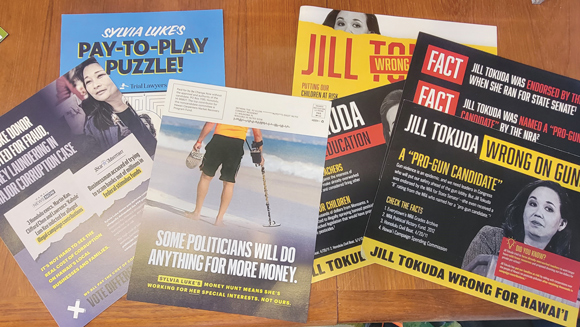
Photo: Alfredo Evangelista
Backfired?
For the State and Federal races, some political pundits called it the nastiest campaign ever, likely referring to the races for Lt. Governor and Congressional District 2 and maybe to a lesser extent, the Governor’s race.
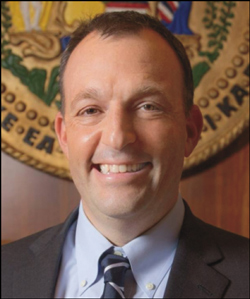
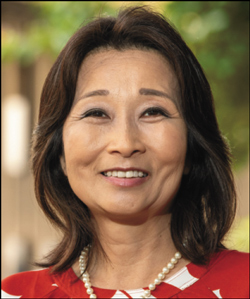
Lt. Governor Josh Green easily beat his six Democratic challengers including businesswoman Vicky Cayetano (who announced her candidacy in August 2021) and Congressman Kai Kahele (who did not announce his candidacy until May 2022). Cayetano and Kahele—in what they called unprecedented—held a joint press conference on July 27—seventeen days before Primary election day and about a week after voters received their ballot—to question Green’s personal finances. Nevertheless, Green crushed both of them with 60.6 percent of the vote; Cayetano placed second with 20.1 percent of the vote while Kahele received 14.4 percent of the vote. (On Maui, Green received 57.2 percent; Kahele received 23.2 percent while Cayetano received 13.3 percent.) On the Republican side, Duke Aiona easily bested BJ Penn (37,406 to 19,667) and eight others. On Maui, it was closer as Penn received 3,021 votes to Aiona’s 3,573 votes. Penn did not concede.
The Lt. Governor’s race was deemed a toss-up based on the recent polls. Of the six Democratic candidates, four were deemed to be within the margin of error the polls’: House Finance Chair Sylvia Luke, former Honolulu City Council Chair Ikaika Anderson, former Honolulu Mayoral candidate Keith Amemiya and Chamber of Commerce president Sherry Menor-McNamara (of the Menor clan). The race became ugly with Be Change Now formerly known as Pacific Resource Partnership—the Carpenters Union Super PAC—casting aspersions on Luke’s ethics through guilt by association. (The three mailers our household received highlighted the words “pay to play” and “corruption.”) The Carpenters Union endorsed Ikaika Anderson and apparently was furious with Luke’s refusal to make permanent the GET increase for the Honolulu rail project.
Evidently, the efforts by Be Change Now didn’t help statewide. Luke received 87,456 votes (33.7 percent); Anderson received 67,159 votes (25.9 percent); Amemiya received 56,923 votes (21.9 percent); while Menor-McNamara received 25,249 votes (9.7 percent). On Maui, Be Change Now perhaps worked better as Anderson received 10,646 votes (34.8 percent); Luke received 7,792 votes (25.4 percent); Amemiya received 6,019 votes (19.7 percent); and Menor-McNamara received 2,067 votes (6.8 percent). For the Republicans, Seaula Tupa‘i, Jr. bested two other candidates with 44.1 percent of the vote.
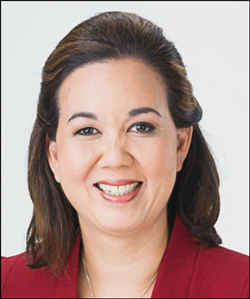
For Congressional District 2 (Kahele did not seek re-election because he ran for Governor), it also turned nasty with a Super PAC called “Mainstream Democrats PAC” sending out mailers (our household received four) against former State Senator Jill Tokuda. (Tokuda was no stranger to being opposed by a Super PAC as Be Change Now opposed her in her 2018 bid for Lt. Governor against Josh Green.) Super PAC “Dad for America” sent out pro-Patrick Branco mailers while Super PAC “Congressional Progressive Caucus PAC” sent out pro-Tokuda mailers.
In the end, Tokuda received 48.6 percent of the vote (62,056) while Branco received 21.1 percent of the vote (26,965). On Maui, Tokuda received 41.5 percent of the vote (12,655) to Branco’s 20.2 percent (6,163). Tokuda faces Republican Joe Akana and Libertarian Michele Tippens in the General Election.
(In a couple of instances, a Super PAC provided some of the lighter moments. A mailer supporting House Speaker Scott Saiki’s primary opponent Kim Coco Iwamoto was sent to neighboring Representative Della Au Bellati’s community instead. In addition, some mailers supporting underdog Congressional candidate Sergio Alcubilla in urban Honolulu were sent to Maui addresses.)
And yes, U.S. Senator Brian Schatz easily beat his opponent: 227,599 (87.7 percent) to 15,655 (6.0 percent). On Maui, Schatz received a similar percentage of the vote (87.2 percent). In the General, Schatz will be pitted against Republican Bob McDermott, Libertarian Feena Bonoan, Green Party candidate Emma Pohlman and Aloha ‘Āina Party candidate Dan Decker.
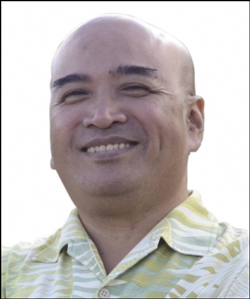
For Maui’s state legislative seats, all three senate seats and six representative seats were up for election due to re-apportionment. In Senate District 5, Gil Keith-Agaran–the only state legislator from Maui of Filipino ancestry—was unopposed and received 7,993 votes (75.8 percent).
In Senate District 6, there will be a new State Senator due to Senator Roz Baker’s retirement. State Representative Angus McKelvey (3,889 votes) beat Shaina Forsyth (1,496 votes) and Tamara Goebbert (1,112 votes) to become the Democratic party nominee. McKelvey will face Republican Sheila Walker (who beat Philip Raya) and Green party candidate Melissah Shishido in the general election.
In Senate District 7, incumbent Lynn DeCoite beat fellow Democrats Walter Ritte and Leo Caires with 55.1 percent of the vote (6,700) compared to Ritte’s 30.6 percent (3,715) and Caires’ 5.9 percent (715). DeCoite will face Republican Tamara McKay in the general.
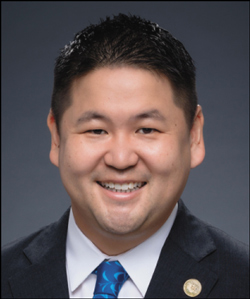

In the House, Representative Troy Hashimoto (District 10) was also unopposed and received 4,991 votes. Representative Justin Woodson in District 9 crushed challenger Sam Peralta, 3,033 to 817 and with no General Election opponent, is elected.
Incumbent Kyle Yamashita (District 12) was unopposed in the primary and received 4,961 votes. He will face Republican Dan Johnson (1,145 votes) and Green party candidate Summer Starr (25 votes) in the general.
Appointed incumbent Linda Clark (District 13) was defeated by Mahina Poepoe. Poepoe received 2,382 votes, Clark received 1,580 votes and Chase Nomura received 859 votes. Poepoe faces Republican Adam Scott and Green party candidate Nick Nikhilananda in the general.
There was no incumbent in District 11 as Tina Wildberger did not seek re-election (Kelly King initially filed for the race but withdrew and filed for Mayor). For the Democrats, Terez Amato defeated Randal Mahi‘ai (2,709 to 966) and will face Republican Shekinah Cantere in the General Election. Cantere eked out a close win over Netra Halperin which prompted a recount which confirmed Cantere’s victory.
In District 14, former Councilmember Elle Cochran beat Kanamu Balinbin 1,991 to 1,133 in the Democratic primary. Cochran will face Republican Kelly Armstrong and Aloha ‘Āina party candidate Leonard Nakoa in the general. Cochran hopes to be the second member of Maui’s legislative team of Filipino ancestry.
“I’m grateful for the continued support from the people of Central Maui and I’m looking forward to working with the new Maui team—we’ll have a new Senator for West Maui and Waikapū Gardens,” said Keith-Agaran. “I hope Kyle Yamashita will be back—he’s played a strong role in the House for many Maui priorities—and with the changes in the House, we’ll have untested representatives from South Maui, the canoe district and West Maui/Waihe‘e.”
From the perspective of the Filipino community statewide (are we still the “sleeping giant”?), there appears to be a number of losers albeit all but three winners still face General Election races. [See tall blue box]
When asked why Maui’s Filipino community should support them, Bissen and Victorino provided the following responses.
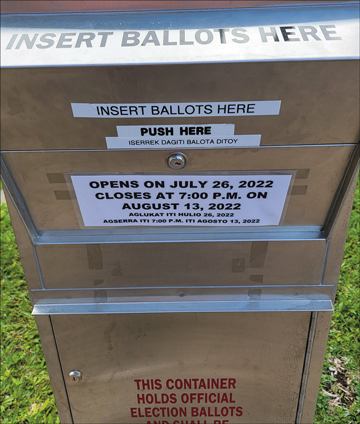
Photo: Alfredo G. Evangelista
“The Filipino people are known for their industriousness, work ethic, perseverance, determination, love for family and culture, and the value they place on education,” said Bissen. “It is common for multiple families to live under the same roof due to the challenges in buying or renting a home, until a family can save up enough to buy one. It is common for professionals to come from the Philippines and accept a job they are overqualified for just so they are able to earn a living. It is common to have a full-time job and one or two part time jobs in order to make a living and support their families. And to be able to send one or more of their children to a college or university. All locals, including the Filipino community, face the same challenges of trying to pay for housing, food, utilities, gas and other costs of living here. They want their voices heard. Our residents need a safe community, good livable wages, clean water, and a beautiful environment for our future generations. My plan is to raise prosperity for all Kama‘āina residents of Maui, including our Filipino community. My values and plan are consistent with yours. Unlike past promises made and broken, I pledge to give maximum effort to fostering Kama‘āina prosperity.”
“Joycelyn and I are deeply grateful for the close working relationship we’ve developed with Maui’s Filipino community over the past couple of decades,” said Victorino. “We’ve come to respect and admire the Filipino community’s work ethic, commitment to family, entrepreneurial spirit and mutual support for one another. We have personally experienced ‘the heart of the Filipino.’ It has been a joy to participate in your programs and events as an elected official and as a private citizen. Joycelyn and I love to help with the Barrio Fiesta, scholarship programs and pageants, and especially Binhi at Ani’s senior feeding program. Thanks to your support, we are headed to the General Election in November. We humbly ask for your continued support. Maraming Salamat Po!”
Will Maui’s Filipino community be the difference maker in the Mayor’s race? We’ll know in less than twelve weeks.
 Alfredo G. Evangelista majored in Political Science at the University of Southern California (1980) after graduating from Maui High School (1976) and before receiving his law degree from the University of California at Los Angeles School of Law (1983).
Alfredo G. Evangelista majored in Political Science at the University of Southern California (1980) after graduating from Maui High School (1976) and before receiving his law degree from the University of California at Los Angeles School of Law (1983).
